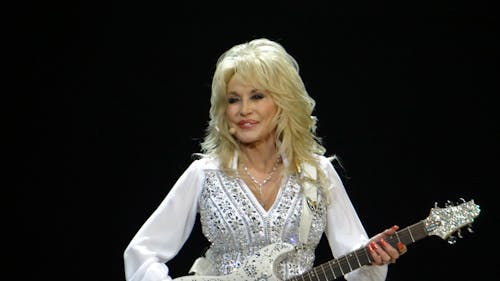Dolly Parton's legacy: From country starlet to philanthropist

There aren’t enough words to summarize the legacy of country music icon Dolly Parton. From breaking boundaries as a woman in country music to blossoming into a savvy and kindhearted businesswoman, Parton has done it all.
The country starlet boasts 50 Grammy Award nominations, two Guinness World Records and is the only country artist that has had a top 20 hit on the Billboard Hot Country Songs chart for six consecutive decades. She even has a theme park named "Dollywood" in her honor.
Parton is a songwriting trailblazer, writing more than 3,000 songs over the span of her 50-year career, many of which are culturally ubiquitous: “Jolene” plays routinely at almost every country bar in Nashville, and “I Will Always Love You” has maintained its popularity after being further popularized by Whitney Houston’s remake of the track.
But before her life of glam, the country singer came from much humbler beginnings. Throughout her music, most famously in the track, “Coat of Many Colors,” Parton recounts her rags-to-riches story, which later inspired the film, "Dolly Parton's Coat of Many Colors."
Despite these difficulties, Parton has committed her platform to help unfortunate communities. In 1988, the star formed the Dollywood Foundation to help reduce high school dropout rates in her home county of Sevier County, Tennessee.
Shortly after, in 1995, she launched a program called Dolly Parton's Imagination Library to promote literacy among children in Tennessee by sending every child up to the age of 5 in participating communities a free book. The program has since expanded worldwide, with children in Europe and Australia even receiving some of the millions of books.
And after the 2016 wildfires in East Tennessee, Parton held a telethon that raised $13 million for residents who were hit hard.
Most recently, Parton was listed as one of the major funders for the Moderna coronavirus disease (COVID-19) vaccine. She announced last year that she would donate $1 million to the Vanderbilt University Medical Center to aid its research efforts.
“But I just felt so proud to have been (a) part of that little seed money that will hopefully grow into something great and help to heal this world,” Parton said on BBC One’s “The One Show.”
Parton was even offered the Presidential Medal of Freedom twice by former President Donald J. Trump's Administration for her cultural impact, according to the Los Angeles Times. She turned it down both times, citing her husband’s illness and safety risks due to the pandemic. But, the singer revealed that she was contacted again about the award by President Joseph R. Biden Jr.
Parton, who has long been known to be apolitical, is wary about accepting the award and dipping her foot in political waters. As one of her notable talents is the ability to resonate with audiences across the board, she said she doesn’t want to get involved in political fights, according to the Los Angeles Times.
The singer has also had a complicated relationship with feminism, highlighting the irony of her feminist-friendly platform. She has been praised by feminists for paving the way for women in country music, a largely male-decorated space, and celebrating the LGTBQ+ community. But after claiming she wasn’t a feminist in a podcast, she later shifted her stance in a segment with Time Magazine and explained that she is.
"I suppose I am a feminist if I believe that women should be able to do anything they want to," Parton said.
Most recently, Parton released a new version of her 1980's hit “9 to 5,” rebranded as “5 to 9,” for a Super Bowl commercial for Squarespace, a website-building platform. The song, which was meant to be an ode to side hustlers, is now under fire for a number of reasons.
Featuring women who spend their time outside of work chasing after their dreams, the number has been criticized for its tone-deaf message – hustling in a pandemic looks different than it did in prior circumstances.
As a writer from The New York Times said, people are simply trying to make ends meet, especially working mothers. While it is unclear whether Parton was behind the lyrics or treatment of the video, this move is uncharacteristic of her.
No public figure is perfect, and Parton certainly isn’t. But despite it all, the icon has undoubtedly led a career full of power moves, humanitarian efforts and musical mastery that has irreversibly shaped country music for the better.



